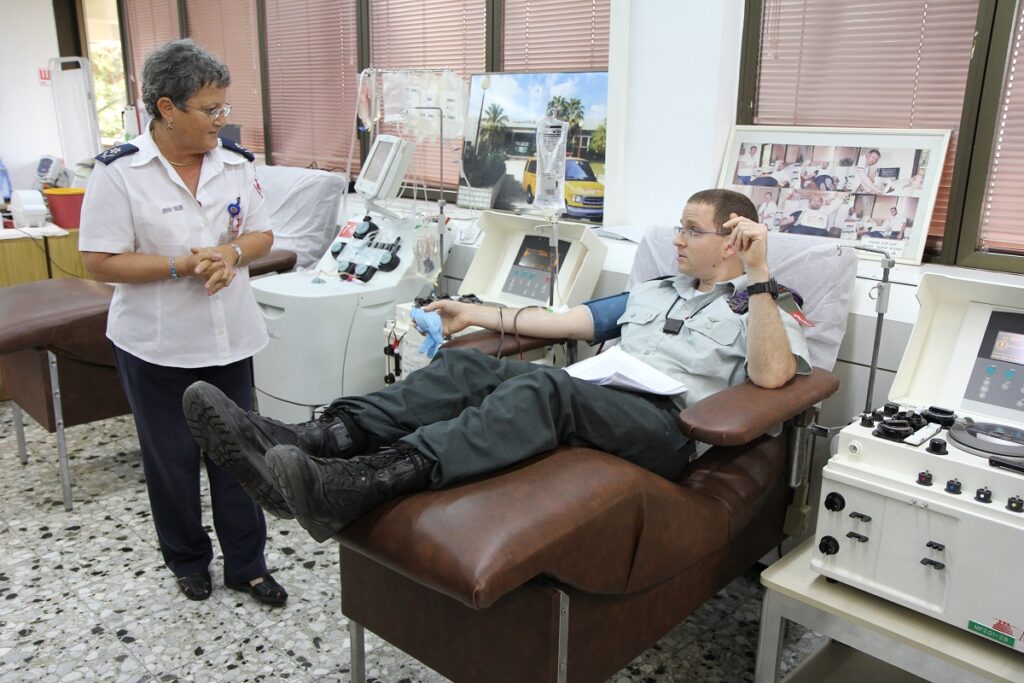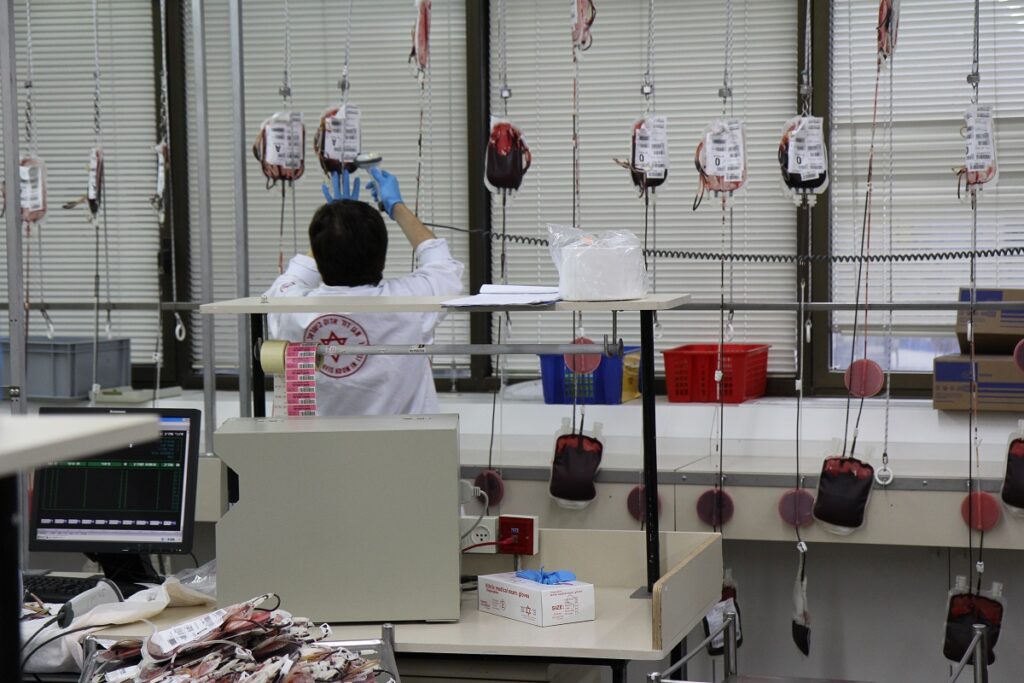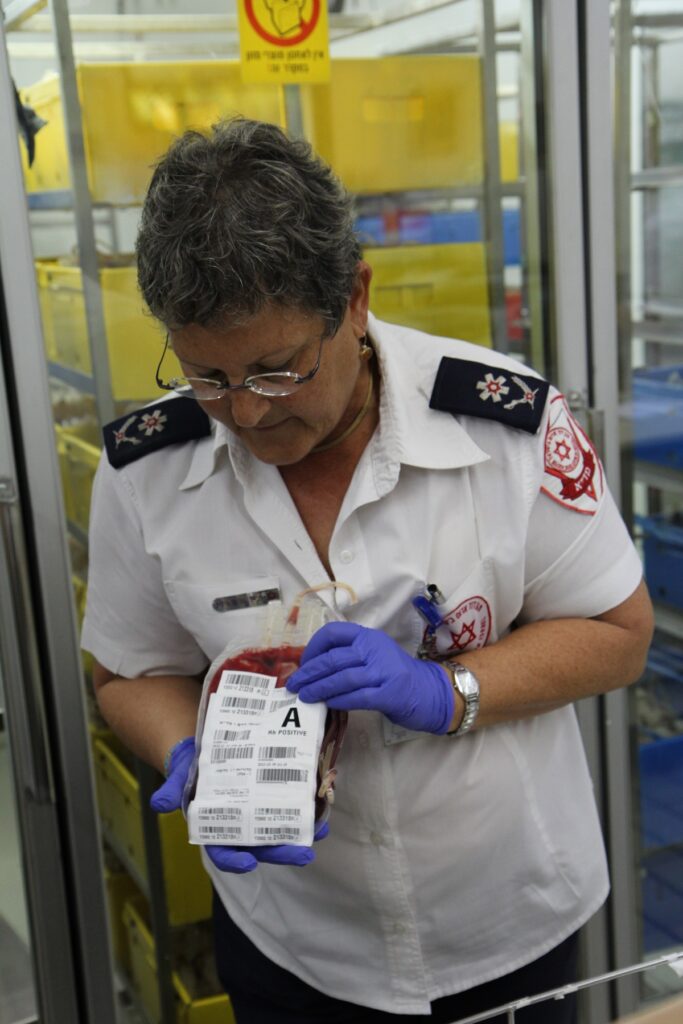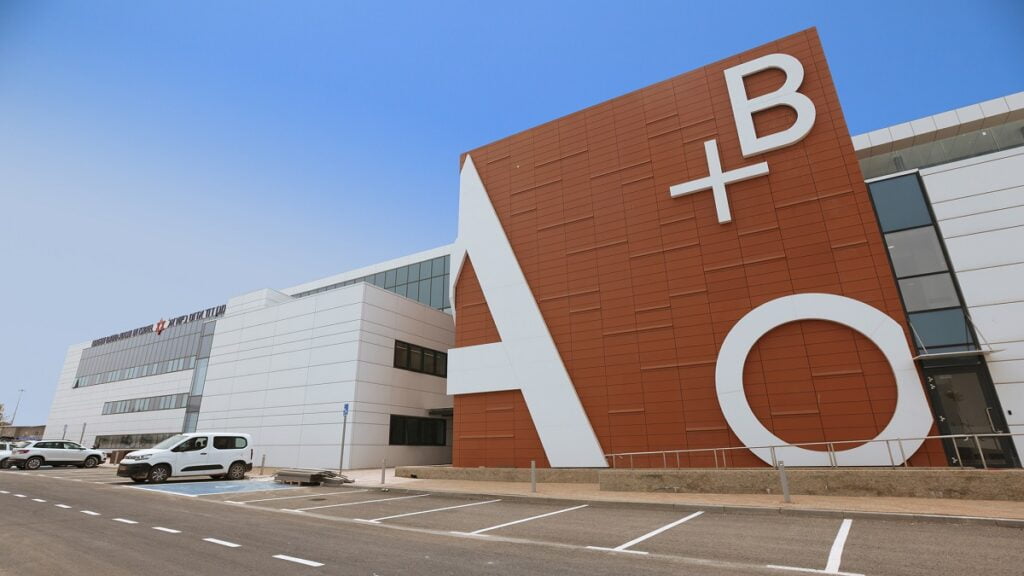Nearly 50 feet below ground, Israel’s Magen David Adom (MDA) medical service has opened its $135 million facility – the world’s most secure national blood bank developed to become part of the country’s national defense strategy against war, missile attacks, natural disasters, terrorism, and state emergencies.
“To the best of our knowledge, this is the first blood center that is actually built in an underground setup which makes it very secure and protected,” Prof. Eilat Shinar, the director of blood services at Magen David Adom, tells NoCamels, “It is shielded against conventional as well as chemical and biological weapons as well as earthquakes. That’s one of the reasons we built it the way we built it.”
At least four years in the making, the Marcus National Blood Services Center, which first broke ground in Ramle in 2016, was built under the precept that Israel’s blood is considered one of Israel’s most strategic sources for its survival and as such, it is imperative to protect it.
While the center was inaugurated last week, with President Isaac Herzog and other dignitaries in attendance, it will become fully functional this summer.
At the ceremony, Herzog said the center “embodies the most moving essence of our shared humanity. To receive a blood transfusion – the irreplaceable gift of life – from complete strangers is a stark reminder that we are one living, breathing tapestry of humanity, now safeguarded in this impressive new center,” according to a statement.
The center will double Israel’s blood-processing capacity, enabling the country to produce as much as half-a-million units of blood each year, from the 290,000 units possible today, to meet the needs of Israel’s growing population. Magen David Adom currently collects 95 percent of the country’s blood donations and distributes all the blood needed by the IDF.
“Blood is considered one of the strategic sources in Israel – so we built the blood processing facility big enough to serve the population of Israel for the next 20 years,” says Prof. Shinar.

Even more unique to the facility is that the blood center features six floors, with three of them underground on more secure levels.
“This enables blood processing to continue uninterrupted even when the country is under attack — ensuring Israel will have the blood it needs when it’s needed most,” Catherine Reed, CEO of American Friends of Magen David Adom, tells NoCamels.
Israel’s experience with rocket attacks highlights the importance of protecting national blood reserves from potential attacks, Reed says. “This was further highlighted by recent events in Ukraine, where healthcare facilities haven’t been immune from being targeted. Israel was the first country to protect its blood supply this way, but I’m certain we will be seeing more reinforced blood banks in the years to come,” she adds.
New technologies and modern architecture
Prof. Shinar, a renowned hematologist, tells NoCamels that the underground blood center will include a number of new and innovative technologies related to blood work.
She says due to the space “we will be able to introduce a lot of automatization in blood separating procedures and testing procedures” as well as new techniques in genetic blood typing,” she continues, “When you want to introduce more automated robotics to do the testing, you need more space — as opposed to technicians who do the manual work and just need space to sit.”
“These are things we can’t do in our current facility [in Ramat Gan] because it’s too small.” The current blood center is located at Tel Hashomer Hospital in Ramat Gan, outside Tel Aviv. “We want automated equipment for everything we do, we need more space and not just more space — protected space.”

The center doesn’t just double the country’s blood processing capacity, it also has a secondary system for every critical system in the building, including generators and air conditioners. “Everything has two sources in case something happens — in case one system fails, we have a backup,” says Prof. Shinar.
Sign up for our free weekly newsletter
SubscribeBesides being safe and secure against missile attacks and warfare, Prof. Shinar says that the center is built under the new standards of earthquake resistance. While the first Israeli Standard for earthquake-resistant constructions (IS 413) was launched in 1975 and became mandatory in 1980, amendments were added throughout the 90s and 00s so that it was necessary for buildings to be built and re-built to be resistant to earthquakes. The Israeli National Blood Services, the current facility in Ramat Gan introduced as a division of MDA in 1987, was not built according to the same standards.
Prof. Shinar emphasizes that the new facility will also have protection against cyber attacks. “That means all systems and everything we do is audited by the Israel National Cyber Directorate responsible for cyber defense in the public sphere,” she says.

As previously mentioned, the current blood services facility is not secure enough to meet the needs of Israel in times of war. In the past, during rocket attacks, the MDA had to cease the processing of blood and move the country’s blood reserves into a bomb shelter, interrupting blood production at a time when it might be needed most.
In contrast, the new Marcus Center is shielded with extra-thick concrete walls, blast doors, and airlocks, as well as biological and chemical protection that extends across three subterranean floors. The three above-ground floors house the Human Milk Bank, where mothers’ milk is collected for premature and ill infants, as well as the blood donation center, administrative offices, conference rooms, and dining halls.
“Magen David Adom opened the only human public breast milk bank last year and as of right now it is still operational from the MDA – Bloomberg station in Jerusalem. But it will be moved to the new facility [shortly] and we intend to have double or triple the ability to provide human milk to premature and mature babies,” Prof. Shinar explains.
The first underground floor of the facility houses shielded blood bank laboratories, a transportation center, and secure fleet parking, where all new ambulances will be fully equipped.

The second underground floor houses the Cord Blood Inventory, an R&D molecular lab, and a chemical and biological warfare air-filtration system that enables staff throughout the building to continue working and processing blood in the event of a chemical or biological attack.
At the heart of the third and deepest level lies the Blood Storage Vault, a 300-square-meter safe room shielded against the most severe missile threats, in which Israel’s strategic inventory of 25,000 blood components will be safeguarded in times of war.
To ensure the highest levels of protection and continuity of operations in war scenarios, every critical system has a secondary system, including two ramps leading into the underground floors, four sets of elevators, and four generators.
“Despite being a reinforced facility, the Marcus Blood Center is a very attractive example of modern architecture,” says Reed, “Great efforts were made to bring natural light into the building too, even on the subterranean floors. Only in the event of an attack or another emergency will the blast shutters on the windows be closed. We hope it will be a building that the facility’s 375 employees and the visiting public enjoy being in.”
The center bears the name of Bernie Marcus, the founder of Home Depot, and his wife, Billi. The American philanthropists donated $35 million to the project. Other prominent donors include Miriam and the late Sheldon Adelson, The Leona M. & Harry B. Helmsley Charitable Trust, and Bloomberg Philanthropies, Michael R. Bloomberg’s charitable organization.
The American Friends of Magen David Adom, through the generosity of its donors, raised the vast majority of the $135 million required to build the Marcus National Blood Services Center, including the $35 million donated by Billi and Bernie Marcus themselves. Moshe Noyovich, the Israel representative and project engineer, also played a key role in overseeing the construction of the facility, according to Reed.
Related posts

Editors’ & Readers’ Choice: 10 Favorite NoCamels Articles

Forward Facing: What Does The Future Hold For Israeli High-Tech?

Impact Innovation: Israeli Startups That Could Shape Our Future




Facebook comments